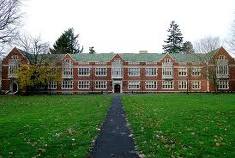I saw Blue Like Jazz a bit ago, now. I liked it. I’m sure you’re not surprised.
I’m biased, but I really liked it, I did. And I laughed. A lot. It probably has something to do with the fact that I was sitting next to

Don, who laughed even at the parts I didn’t get (the sound still has to be calibrated, or something like that). It was so fun to sit together and watch the movie adapted from his book, with fictional characters based on our lives. Fun and not as weird as I thought it would be.
I’ve been used to the idea of seeing someone named Penny on the screen for a while now. Don sent me the screenplay several years back. I was immensely flattered that he had created such a virtuous character and put my name on it. I was flattered, and a little dismayed.
I texted Don my thoughts on the movie. They went something like this: “I love it! You did such a great job portraying Reed. And you made me look like hot shit!”
Don, being ever sensitive to portraying his friends on the page and on the screen, texted me back a worried – I might even say agonized – message. “You think I made you look like shit? I’m so sorry!”
I had to explain to Don, as I feel I must explain to you, that it’s difficult to be immortalized at the age of 21. Especially when you are immortalized to fit the dictates of fast-paced, conflict-driven story writing. Without giving any details away I’ll just say that Penny-in-the-film is a lot more virtuous and dare-devil than Penny-in-the-flesh.
There were several parts where Penny talks about her mother, and these bits made me tear up – cry, even. I’m not sure what they’ll do to you, but it was difficult to see her struggle with the reality of having a homeless and schizophrenic mother. But, at least for me, it was liberating, too. It’s been nine years since I was at Reed and ignoring my mom, and we’ve come a long way since then. I no longer have to deal with the guilty and shameful feelings of knowing I’ve let my mother languish on the streets with no one to care for her. I’m glad Penny’s story is no longer my own.
Blue Like Jazz is a good, and above all, funny movie. I’ll definitely watch it again and again. I may not have the same response as those who grew up in the church, because that’s just not my story. I’ll leave it to the rest of you to decide whether it did a good job portraying the struggle to come to terms with one’s upbringing and one’s faith. For me, I resonated with the struggle to be honest and true to yourself, even when it’s not a popular thing to do. Truth be told, that’s still a lesson I am learning.
—–
One final thing: you should know, Penny in the movie may be cooler than Penny in real life, but I’ll tell you what: my conversion story is way better than hers! For that, you’ve got to read the book. (***OK, when I say stuff like that, it hits me: It’s so weird, it’s so weird, it’s so weird to be immortalized in a book and a movie!!***)
Thanks for reading.

